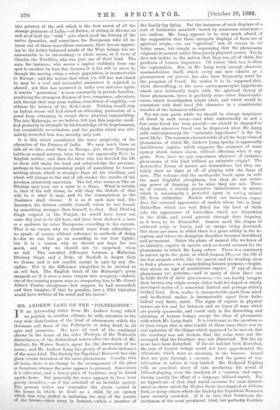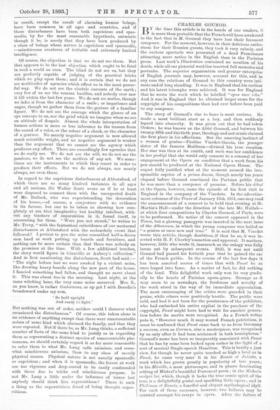MR. ANDREW LANG ON THE "POLTERGEIST."
IN an interesting letter from Mr. Andrew Lang, which we publish in another column, he calls attention to the very wide distribution of the kind of phenomena which the Germans call those of the Poltergeist, or noisy fiend, in all ages and countries. We have all read of the continual alarms in the house of the elder Wesleys, of the Tedworth disturbances, of the Abbotsford noises after the death of Mr. Bullock, Sir Walter Scott's agent for the decoration of his house; and Mr. Andrew Lang has plenty of modern instances of the same kind. The Society for Psychical Research has also given recent instances of the same phenomena. Usually, with all noise, there is no change in the arrangement of the glass or furniture whence the noise appears to proceed. Sometimes it is otherwise, and a heavy piece of furniture may be found upside-down. But generally the noise appears to have been purely imitative,—as if the mischief of an invisible agency. The present writer can remember the alarm caused in the house in which he lived as a child by an agency which was very skilful in imitating the step of the master of the house,—then away in Ireland,—when a member of the family lay dying. But the instances of such displays of a sort of boisterous mischief—heard by numerous witnesses— are endless. Mr. Lang appears to be very much afraid of the supposition that these energetic displays of force are of spiritual origin,—we use " spiritual " not, of course, in its better sense, but simply as expressing that the phenomena originate in mental rather than purely physical causes. Yet he does not incline to the notion that they are, all of them, the products of human imposture. Of course that, too, is often the explanation. But, as Mr. Lang truly enough observes, somnambulism itself, which every one now admits as a phenomenon sui generis, has also been frequently acted for the purposes of fraud. He wishes it to be supposed that, while discrediting as the mere anthropomorphic hypothesis which men habitually begin with, the spiritual theory of these phenomena, there is probably some other discoverable cause, which investigation might elicit, and which would be consistent with their bond fide character in a considerable number of the instances adduced.
For our own parts, while we should be always suspicious of fraud in such cases,—and while undoubtedly in not a few cases fraud has been proved,—we should be disposed to think that wherever fraud can be disproved, what Mr. Lang calls contemptuously the "animistic hypothesis," is far the most likely. The common characteristic of all the large class of phenomena of which Mr. Andrew Lang speaks, is apparently mischievous caprice, which suggests the existence of some agency which causes alarm, without effecting what it sug- gests. Now, have we any experience whatever of imitative phenomena of this kind without an animistic origin ? The destructive forces of nature are tremendous, but they cer- tainly show no signs at all of playing with the fears of men. The volcano and the earthquake burst upon us with the most frightful abruptness, but they do not evince any power of feigning to be what they are not. There is, of course, a certain protective imitativeness in nature which is occasionally a powerful agent in sating animal life from extinction. Snakes which are harmless repro- duce the external appearance of snakes whose bite is fatal. Butterflies which are well fitted for the food of birds take the appearance of butterflies which are disgusting to the birds, and avoid pursuit through thus feigning, as it were, to be distasteful. Insects mock the shapes of withered twigs or leaves, and so escape being devoured. But these are cases in which there is a great utility in the de. ception, and where the deception therefore becomes hereditary and permanent. Below the plane of mental life, we know of no imitative caprice in nature such as would account for the phenomena to which Mr. Lang refers. There is a constancy in nature up to the point at which human life,—or the life of the few animals which, like the parrot and the monkey, seem to find a pleasure in counterfeiting human purpose,—begins, that shows no sign of mischievous caprice. If any of these phenomena are genuine,—and in many of them there can be little doubt of their genuineness,—we can hardly imagine their having any origin except either half-developed or wholly developed malice of a somewhat limited and perhaps strictly bridled kind. Now, malice is inconceivable apart from mind, and ineffectual malice is inconceivable apart from finite, indeed very finite, mind. The signs of caprice in physical nature are few and far between, and we know of none which are purely spasmodic, and result only in the disturbing and alarming of human beings, except the class of phenomena with which Mr. Lang deals. It is irrelevant to the question as to their origin that in nine-tenths of these cases there was no real agitation of the things which appeared to be moved, that the crockery was not broken, that the coins were not dis- arranged, that the furniture was not disturbed. For the air must have been disturbed. If the air had not been disturbed, the ears of human beings could not have apprehended the vibrations which were so alarming to the hearers. Sound does not pass through a vacuum. And the power of ven- triloquism in nature is very limited. Mr. Rudyard Kipling tells an excellent story of rata producing the sound of billiard-playing, even the mockery of a 'cannon,' and repro- ducing exactly the effect of a long-ago billiard-match. But no hypothesis of that kind would account for such disturb- ances as those which Sir Walter Scott investigated at Abbots- ford, or many others which the Society for Psychical Research have recently recorded. If it be true that boisterous dis- turbances of the most persistent kind, but perfectly fruitless in result, except the result of alarming human beings, have been common in all ages and countries, and if these disturbances have been both capricious and spas- modic, by far the most reasonable hypothesis, animistic though it be, is surely that they have been produced by a class of beings whose nature is capricious and spasmodic, —mischievous creatures of irritable and extremely limited intelligence.
Of course, the objection is that we do not see them. But that appears to be the last objection which ought to be fatal in such a world as ours. The blind do not see us, but they are perfectly capable of judging of the practical tricks which we play upon them ; and it is certain that we do not see multitudes of agencies which affect us in the most power- ful way. We do not see the electric currents of the earth ; very few of us see the comma bacillus, and nobody ever saw it till within the last few years. We do not see malice, though we infer it from the character of a smile; or impatience and anger, though we gather them from the gesture of a familiar figure. We do not see the courage which the glance of an eye conveys to us, nor the grief which we imagine when we see an attitude of despair. Almost the whole interpretation of human actions is more or less inference to the unseen from the sound of a voice, or the colour of a cheek, or the character of a gesture. No merely negative argument is now allowed much scientific weight, and no negative argument is weaker than the argument that we cannot see the agency which produces any effect. There are exceedingly few agencies that we do really see. We do not see the will, we do not see the passions, we do not see the motives of any act. We some- times see the instruments to which they resort in order to produce their effects. But we do not always, nor nearly always, see even these.
In regard to the capricious disturbances at Abbotsford, of which there are so many kindred instances in all ages -and all nations, Sir Walter Scott wrote as if he at least were disposed to connect them with the unexpected death of Mr. Bullock, who was superintending the decoration of his house,—of course, a conjecture with no evidence in its favour, but one to be taken as showing how com- pletely at sea that imaginative but healthy intellect, with- out any tincture of superstition in it, found itself, in accounting for them. "Were you not struck," he writes to Mr. Terry, "with the fantastical coincidence of our nocturnal disturbances at Abbotsford with the melancholy event that followed P I protest to you the noise resembled half-a-dozen men hard at work putting up boards and furniture, and nothing can be more certain than that there was nobody on the premises at the time. With a few additional touches, the story would figure in Glanville or Aubrey's collection." And in first mentioning the disturbances, Scott had said :— "The night before last we were awaked by a violent noise, like drawing heavy boards along the new part of the house. I fancied something had fallen, and thought no more about it. This was about two in the morning. Last night, at the same witching hour, the very same noise occurred. Mrs. S., as you know, is rather timbersome, so up got I with Beerdie's broadsword under my arm, 'So bold upright And ready to fight.'
But nothing was out of order, neither could I discover what occasioned the disturbances." Of course, this taken alone is no evidence of anything except that there were unaccountable noises of some kind which alarmed the family, and that they were repeated. But if there be, as Mr. Lang thinks, a sufficient number of facts of the same kind to justify us in regarding them as representing a distinct species of unaccountable phe- nomena, we should certainly regard it as far more reasonable to refer them to what Mr. Lang calls animism, and some- what mischievous animism, than to any class of merely physical causes. Physical nature is not usually spasmodic or capricious ; and when it is spasmodic, the forces at work are too vigorous and deep-seated to be easily confounded with those due to tricks and mischievous purpose. Is 'not Mr. Lang a little under the influence of terror lest anybody should think him superstitious ? There is such a thing as the superstitious dread of being thought super- stitious.







































 Previous page
Previous page